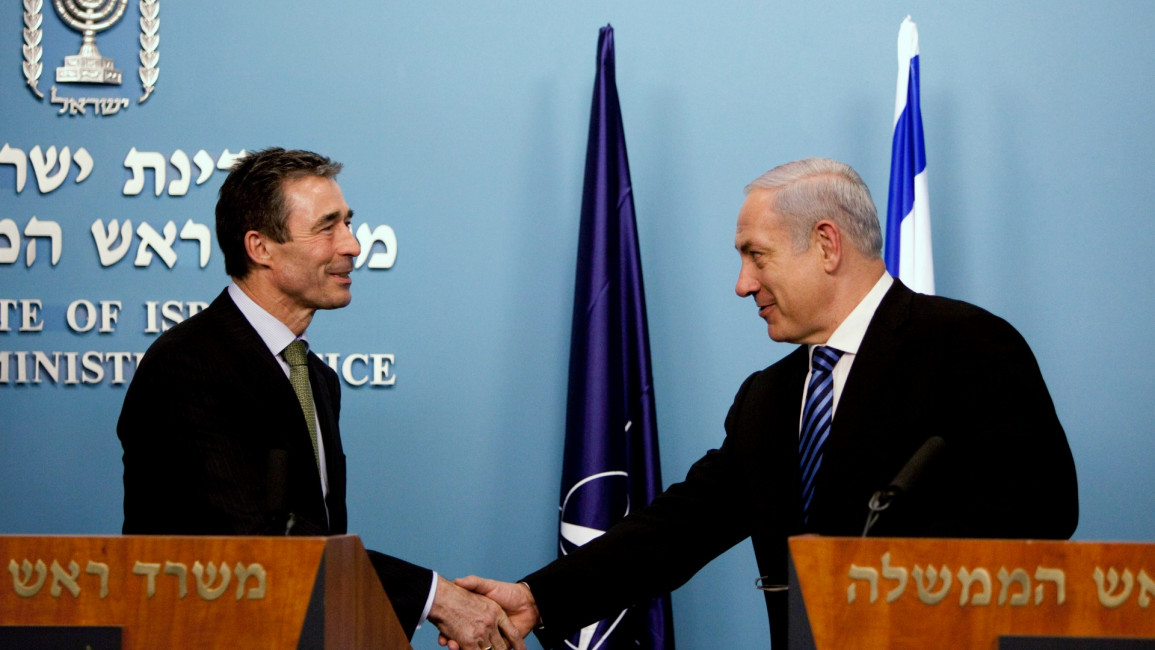
Gaining ground: Israel's permanent representation at NATO
The news that Israel will now have a permanent representation at NATO headquarters is a prime example of how the colonial security rhetoric has been approved and endorsed at an international level.
Israel, which was previously a participant in the NATO Mediterranean Dialogue Programs, along with Algeria, Egypt, Jordan, Mauritania, Morocco and Tunisia, can now look forward to more direct contributions to the alliance, as well as reaping its benefits.
An Israeli foreign ministry statement reads: "NATO has notified Israel that Israel can open an office at the organisation's headquarters and complete the process of presenting the credentials of its representative to NATO."
Israeli Prime Minister Benjamin Netanyahu hailed the move as "an important step that aides Israeli security".
The NATO website stipulates that it has asked "all partners to open diplomatic missions to the Headquarters of the Atlantic Alliance in Brussels". While the statement may sound generic, Israel's inclusion is proof of the intentional lack of discernment when it comes to the settler-colonial manifestation in Palestine.
 |
not only does the permanent mission recognise Israel's presence; it also validates colonialism at a higher level than the UN |  |
Additionally, Israel's permanent representation at NATO is an affirmation of the alliance's disregard for violations of international law and an example of encouraging and rewarding such violations at an international level. This is consistent with NATO's behaviour, particularly concerning its intervention in Libya and subsequent involvement in the Mediterranean under the pretext of disrupting human trafficking.
Turkey - which in the past had opposed collaboration between NATO and Israel following the Mavi Marmara raid in which Israeli soldiers murdered Turkish activists - stated that "We said we may welcome this if all countries are treated equally. It's important that not only Israel but other southern partners are granted the same right."
Immoral equivalence
Official recognition of Israel's presence at NATO highlights several issues. Both Israel and NATO operate through violations of international law, and according to the imperialist agenda of intervention. Both turn a blind eye to past violations of international law.
Furthermore, not only does the permanent mission recognise Israel's presence; it also validates colonialism at a higher level than the UN. The UN has long functioned as an alleged guardian of human rights while sustaining its existence through the provocation of perpetual conflict. The representation at NATO blatantly ridicules any semblance of chastisement which the UN has reserved for Israel through countless non-binding resolutions.
 |
For decades, Israel forced its security propaganda onto the international community until it became acceptable mainstream discourse |  |
Perhaps the greatest similarity and exposure of such violence can be found in the introduction to the NATO charter, which is a hypocritical equivalent to Israel's security rhetoric. The introduction states that "The Parties to this Treaty reaffirm their faith in the purposes and principles of the United Nations and their desire to live in peace with all peoples and all governments."
Clearly, both Israel and NATO have pontificated over this ideal – though only in a subjective manner that reflects ulterior motives, namely the projection of violence upon other entities in order to retain political and strategic superiority.
According to Article 1 of the NATO charter, the alliance seeks to "settle any international dispute in which they may be involved through peaceful means in such a manner that international peace and security are not endangered, and to refrain in their international relations from the threat or use of force in any manner inconsistent with the purposes of the United Nations."
As demonstrated in Libya, NATO has clearly achieved the contrary of this. However, the alliance is careful to leave the door open to repeating the same cycle of violence - under different motives but always in the name of alleged peace and security - which should translate to perpetual intervention.
 |
through this partnership, Israel has been officially endorsed at an international level and granted opportunities for further participation in violent endeavours |  |
Israel's tactics are similar. Its establishment as a colonial presence in Palestine has continued to expand in line with the Zionist plan for a "greater Israel". In parallel it constructs the legitimate, Palestinian anti-colonial struggle as terror, bolstering its security propaganda particularly through the premeditated, regular bombing of Gaza, as well as occasional targeting in between full scale massacres. Peace, however, is the euphemism for such unwarranted bloodshed.
International affirmation
For decades, Israel forced its security propaganda onto the international community until it became acceptable mainstream discourse. Its permanent representation at NATO headquarters is an affirmation of such a morbid success story.The difference lies in the fact that, through this partnership, Israel has been officially endorsed at an international level and granted opportunities for further participation in violent endeavours - the equivalent of having a permanent, international platform from which it can export its colonial violence, modified according to NATO requirements.
For all its hyperbole about international isolation, which reverberated intensely during Israel's lobbying for inclusion in WEOG in 2013, the latest news affirms that, far from being isolated, Israel has been granted permission to carve a niche for itself, where its brutality is rewarded, emulated and disseminated.
Ramona Wadi is an independent researcher, freelance journalist, book reviewer and blogger specialising in the struggle for memory in Chile and Palestine, colonial violence and the manipulation of international law. Follow her on Twitter: @walzerscent
Opinions expressed in this article remain those of the author and do not necessarily represent those of The New Arab, its editorial board or staff.




